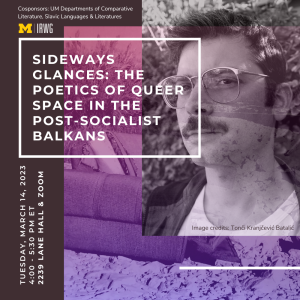Sideways Glances: The Poetics of Queer Space in the Post-socialist Balkans


In the last twenty years, activists, artists, and scholars in the former Yugoslavia have begun to unearth, document, and reconstruct queer histories, spaces, and cultural practices that have historically been marginalized and threatened by erasure in the region. This “archeological impulse” comes on the wave of queer activism and the rise of LGBTQ+ visibility politics following the collapse of state socialism in the 1990s, while frequently challenging western perceptions of the region within the dominant Orientalizing and Cold War imaginaries. Drawing on this growing body of scholarship and activism, my presentation examines the transformation of štajga, or the cruising grounds—from a previously invisible site of sexual modernity in late Yugoslav socialism into a counter-archive of queer history in the postsocialist present. In particular, I focus on Uroš Filipović’s Staklenac (Glass Arcade, 2002), a seminal work of queer autofiction in Serbia, alongside the more recent work of the queerANarchive collective, founded in 2010 in Split as an attempt to document, archive, and render discursive the geographies and practices of queer culture in the context of postsocialist Croatia. I argue that štajga serves not only as an historical alternative to the contemporary politics of queer visibility and respectability, but also as a site that registers the shifting relations between non-normative sexuality, queer poetics, and capitalist form.
This hybrid event is presented by the Lesbian-Gay-Queer Research Initiative (LGQRI) at IRWG with co-sponsorship from the Departments of Comparative Literature, and Slavic Languages and Literatures.
Register to attend in person or on Zoom: https://myumi.ch/Mr7ne
About the Speaker:
Vladislav Beronja is an Assistant Professor in the Department of Slavic and Eurasian Studies at the University of Texas at Austin. He is a co-editor of Post-Yugoslav Constellations: Archive, Memory, and Trauma in Contemporary Bosnian, Croatian, and Serbian Literature and Culture (de Gruyter, 2016), and has published widely in the field of contemporary Balkan literature and popular culture. His translation of Dino Pešut’s novel Tatin sin (Daddy’s Boy) is forthcoming with Fraktura Publishers in the fall 2023.
Sponsor & Cosponsors:
Department of Slavic Languages & Literatures
Department of Comparative Literature
